War in Mali. Russians are victims of jihad in West Africa
Hotel shooting
The crew of the An-124 "Ruslan" arrived in Mali the day before - to transport construction equipment from Oslo. 18-19 November the plane made a flight and was preparing to fly to the base. At the Radisson Blue Hotel, considered the most prestigious hotel in the Malian capital, Bamako, 12 pilots stayed. On Friday morning, seven pilots decided to have breakfast, for which they descended to a restaurant operating in the hotel building. When the commander of the crew of the plane, Alexander Samoilov, and six of his subordinates were sitting at a table, armed terrorists burst into the hotel. All people who were on the hotel were taken hostage by a terrorist group. In the hands of the terrorists was about 170 people. In response to the actions of the terrorists, the Malian police and special forces launched an assault on the captured hotel, which they managed to free after the operation. However, as reported by the Malian authorities, at least 21 people were still killed by terrorists. Among the dead - and our compatriots.
Six Russian citizens were shot an hour after the terrorists attacked the hotel. Crew commander Alexander Samoilov miraculously escaped. Among the dead are aircraft engineer for the operation of LAID Stanislav Dumansky, 1973 year of birth; airborne radio operator Vladimir Kudryashov, 1975 year of birth; flight engineer Konstantin Preobrazhensky, born 1959; Loud-master Sergey Yurasov, 1963 year of birth; navigator Alexander Kononenko, 1963 year of birth; aircraft engineer for the operation of LAID Pavel Kudryavtsev, 1988 year of birth. All the dead were citizens of the Russian Federation, residents of the Ulyanovsk region. Therefore, 23 November 2015 was declared on the territory of the Ulyanovsk region as the Day of National Mourning - in memory of the Russian pilots who died in Mali. In addition to the Russians, as a result of the terrorist act, three Chinese citizens and one US citizen were killed. Responsibility for the incident was assumed by the radical Arab-Tuareg group Al-Murabitun, affiliated with the international terrorist organization Al-Qaida, banned in the territory of the Russian Federation. All three militants of the organization who seized the Radisson Blue Hotel were killed by Malian special forces during the assault.
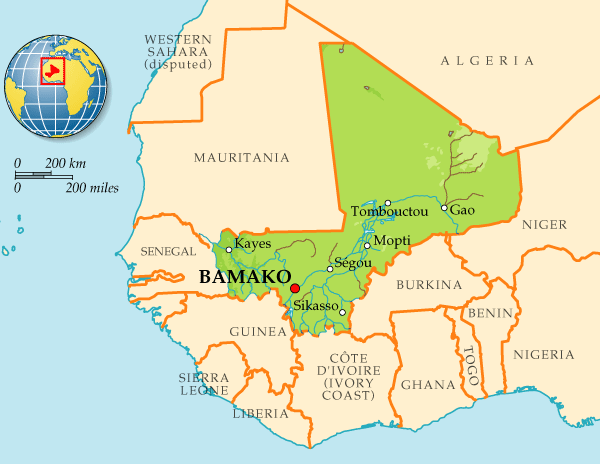
The President of Mali, Bubacar Keita, in connection with the attack of terrorists in the capital, Bamako, declared a ten-day state of emergency on the territory of the state. The leadership of the country has cause for concern - for several years now a real war has been going on in Mali between government forces and radical groups. On the side of the government troops are also fighting the French units and contingents of a number of African countries that came to the aid of the Malian government. The situation in the country was destabilized after the notorious “Arab Spring” 2011 year, affecting the countries of North Africa and reflected in the political situation in several countries of the Sahel, which include Mali. This West African country is a former French colony that gained political independence on 22 in September 1960. Currently, over a large territory of Mali (and this is 24-I country of the world by area - 1 240 192 km²) lives about 16 million people. Mali's birth rate is one of the highest in the world; fertility is 7,4 baby per woman. But, in addition to rapid demographic growth, the country faces a number of economic, social and ethno-political problems. Mali has no access to the sea, and a significant part of the country’s territory is occupied by Saharan sand, which negatively affects agriculture, the main branch of the Malian economy. The overcrowding of Malian villages contributes to the further aggravation of social tensions in society, the formation of slum settlements of marginal people on the outskirts of cities. Naturally, in this situation radical ideas are easily spread.
Big problems of the former colony
However, the key problem of the formation of terrorist groups in Mali are ethnic and confessional contradictions. The fact is that Mali belongs to typical post-colonial states, whose national borders were set absolutely artificially, without taking into account the real ethnic and religious specificity of the regions. A similar situation is observed in other sub-Saharan countries - Niger, Chad, Nigeria, Sudan. The northern regions of the countries listed are inhabited by the Tuaregs, the tuba, the Shoah Arabs, and the southern regions by the Negroids. Over the centuries, contradictions developed between the “white” and the negroid population, between Muslims and non-Muslims. Muslim nomads made regular raids on the sedentary agricultural population of the Sahel, represented by Negroid peoples, with the goal of devastating villages and cities and capturing people into slavery. The colonial expansion of the European powers - Britain and France - only slightly reduced the level of tension in the region, but the decolonization of the African continent again actualized many obvious and hidden contradictions. Nevertheless, Mali has long been able to maintain relative peace on its territory, although military coups took place in the country from time to time, changing the political elite of the Malian state. For more than twenty years, from 1968 to 1991, the military junta was in power in Mali under the leadership of Army General Moussa Traore (born 1936). Coming from the Negroid people to Malinke, Moussa Traore began a military career in the French colonial forces, and after the liberation of Mali, he rapidly grew in ranks and by 1968 was a lieutenant colonel and head of an infantry school. After organizing a military coup, Traore came to power in the country, banned all political parties except the ruling Democratic Union of the Malian people and established the military dictatorship quite common for the African continent.
Compared to other African countries, Mali was a fairly stable state, albeit an extremely poor and economically backward one. However, in 1990, mass protests against the policy of Moussa Traore began in the country, which resulted in the situation in Mali destabilized. In March 1991, the country's military elite overthrew Moussa Traore. At the head of the coup was the commander of the Malian paratroopers, General Amadou Toumani Touré (born 1948), who received a higher military education in the Soviet Union - in the famous Ryazan Higher Airborne Command School. During the year, General Touré was in office. President of the country, after which he handed over power to the civilian president, Alpha Oumar Konare. Alpha Oumar Konare (born 1946) has been at the head of Mali for two consecutive terms - in 1992-2002, after which he, also ten years later, was replaced by General Amadou Toumani Touré, this time already elected head of the Malian state. However, the social and economic problems of the Malian society during the rule of Alpha Oumar Konaré or under the authority of Amadou Toumani Touré were not resolved. Moreover, the population of the country, due to the high birth rate, grew, and economic opportunities did not increase. The most tense situation has developed in the north of the country - in the zone of residence of the Tuareg and the Arabs.
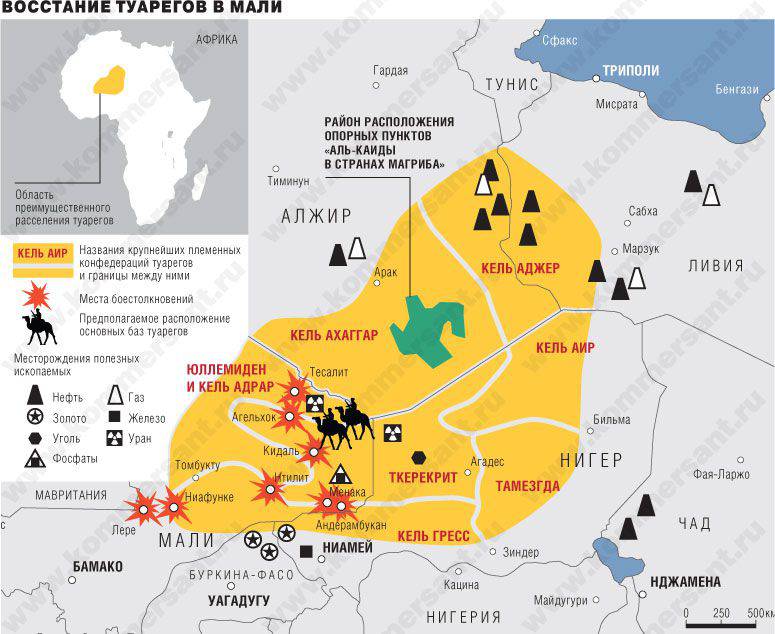
Fight for an independent Azawad
Northern Mali Tuaregs have never been integrated into the postcolonial Malian society. They felt disadvantaged compared to the Negroid peoples of the south of the country, while considering themselves to be a more developed and historically significant nation. Therefore, among the Tuareg people, separatist sentiments were expressed, expressed in the plans for the creation of the Independent State of Azawad, which would include the lands of Mali, Niger, Burkina Faso, Libya and Algeria inhabited by the Tuaregs. Even before the independence of Mali was proclaimed, the French leadership came up with a plan to create the General Organization of the Sahara Regions, which was to include land in the south of Algeria and in the north of Mali, Niger and Chad. In fact, it was a Berber government, which would include the territories of the Sahara inhabited by Tuaregs, Arabs, a tuba and a songai. In fact, France sought through this plan to create a counterweight to the national liberation movement of Algeria, but then refused to implement the plan. The Tuareg lands were divided between Mali, Niger, Algeria, Burkina Faso and Libya. In 1962, the first national uprising of the Tuareg against the young Malian government occurred in Northern Mali. The rebels managed to defeat the troops of the then head of state Modibu Keith. Then Keith called for help the French army, after which the joint Franco-Malian efforts still managed to suppress the uprising. After the victory, Keita began a brutal repression against the Tuareg and the Arab population, causing significant loss of life and devastation of entire areas in the north of the country. In 1958, the city of Azawad suffered a severe drought, as a result of which huge herds of nomads, the Tuareg, died. Thousands of people turned into poor refugees, flooding the cities and towns of not only Mali, but also many neighboring countries. Many refugees fled to neighboring Libya, where they were gladly received by Muammar Gaddafi. The Libyan leader made plans to export the revolution to the neighboring countries of West Africa, while the Tuaregs of Mali and Niger were ideally suited for the role of Libyan influencers in the countries of the Sahel. Therefore, Gaddafi provided shelter to families of displaced persons, work for able-bodied Tuareg. Remittances from relatives working in Libya have become the main source of funding for Tuareg families remaining in Mali. "Libyan origin" and had the funds allocated to support the Tuareg national liberation movement in Northern Mali.
In 1990-1995 and 2007-2009 in the north of Mali and Niger, Tuareg rebellions broke out, but they were suppressed by government forces. Much of the Tuareg who participated in the uprisings emigrated to Libya, where she transferred to the service of Muammar Gaddafi and was incorporated into the Libyan army. During the confrontation, supporters of Gaddafi and the opposition of the Tuareg sided with the Jamahiriya and participated in hostilities on the side of Gaddafi. The overthrow of Gaddafi seriously destabilized the situation in sub-Saharan Africa. For a long time, Gaddafi acted as a mediator between the Tuareg separatists and the governments of Mali, Niger and Burkina Faso, helping to smooth out the contradictions. Tuaregs had the opportunity to serve in the Libyan army, which delayed the passionate part of Tuareg youth in Libya, where she could receive a good reward for military service. Naturally, this, in turn, contributed to reducing social tensions in Mali, Niger and Burkina Faso. After the defeat of Muammar Gaddafi in the war and the assertion of the authorities of the "Transitional National Government", who served in the Tuareg Libyan army, fearing reprisals, returned to their homeland - in Mali and Niger. Here they again turned to separatist sentiment.
In October, 2011 created the National Movement for the Liberation of Azawad, which united several Tuareg military-political groups that advocated the liberation of Azawad in Mali. Since the supply routes passed through the territory of Mali weapons To Libya, the Tuareg, traditionally controlling Trans-Saharan communications, were given the opportunity to acquire modern weapons. Another channel for the supply of weapons to the Azawad separatists was the theft from the warehouses of the Malian army, carried out by Tuareg and Arab soldiers, most of whom soon deserted from the Malian armed forces and joined the insurgent movement. In January, 2012, the Azawad National Liberation Movement, launched an armed uprising in the north of Mali. The immediate leadership of the rebel armed forces was carried out by Mohammed agh Nadjim - Tuareg, who reached the rank of colonel in the Libyan army and had good military training. The core of his troops were former members of the Libyan army. As a result of the swift actions of the rebels, three areas of Northern Mali were completely captured, after which the separatists declared their desire to achieve the complete independence of Azawad from Mali. 1 February 2012, the formation of MNLA captured the city of Menaku. 4 February Tuareg attacked the city of Kidal. The NLAA fighters captured a number of Malian military bases, which made it possible to substantially replenish the stockpiles of weapons and continue fighting in the north of the country.
The successes of the Tuareg in the north of the country were combined with the complete inability of the Malian armed forces to cope with the national liberation movement in Azawad. The result of dissatisfaction with the activities of the country's leadership on the part of the Malian military-political elite was the military coup that took place in Mali 21-22 in March 2012. It was carried out by a military group that formed the National Committee for the Restoration of Democracy and the Restoration of the State in Mali. The committee was headed by the 40-year-old professional military captain Amadou Sanogo (born 1972), who taught English at the Kati military camp. This circumstance, as well as the fact that Sanogo was trained several times and trained in the USA, including the training center of the Marine Corps, made it possible for his critics to accuse the captain of pro-American sympathies. 6 On April 2012, the National Committee for the Restoration of Democracy and the Revival of the State in Mali transferred power to the country to a civilian government headed by President Dionkund Traore (born 1942), a well-known Malian politician who headed the National Assembly from 2007. 1993 was Mali’s Minister of State Defense.
The military coup in Bamako and the change of power in the country allowed the Tuareg separatists to intensify the offensive in northern Mali. Soon after the coup, the NLAA captured the strategically important city of Gao, then - historical the capital of the region is the famous city of Timbuktu. In fact, the entire territory of the Malian Azavad was under the control of the Tuareg national liberation movement. After Azawad was completely liberated from the Malian government, the National Liberation Movement of Azawad announced a unilateral ceasefire in connection with the achievement of its goal. On April 6, 2012, the political sovereignty of the Independent State of Azawad was proclaimed, after which the Executive Committee of the NLA appealed to the world community to recognize the existence of an independent state of the Tuareg, Arabs, Fulbe and Songavai Azavad.
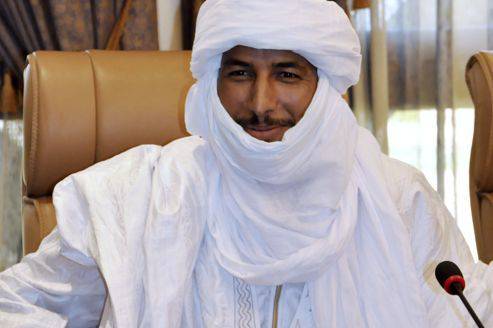 The head of state was proclaimed Bilal ag Asherif (pictured) - the secretary general of the National Movement for the Liberation of Azawad, in the past - a school teacher and entrepreneur. The national movement for the liberation of Azawad announced the absence of territorial claims against neighboring states and stressed that it was ready to create a Tuareg state only in the territory of Mali Azawad.
The head of state was proclaimed Bilal ag Asherif (pictured) - the secretary general of the National Movement for the Liberation of Azawad, in the past - a school teacher and entrepreneur. The national movement for the liberation of Azawad announced the absence of territorial claims against neighboring states and stressed that it was ready to create a Tuareg state only in the territory of Mali Azawad. “Jihadists” of West Africa
However, in the process of building an unrecognized state, the Tuareg national liberation movement faced no less strong than the Malian government troops. Islamists from radical groups associated with the al-Qaeda North African wing have become the main main rival of the MNLA. Islamist groups began to penetrate Mali long before the overthrow of Gaddafi in Libya. After the bloody civil war in Algeria ended in 2002 with the defeat of the Islamists, the remnants of the Algerian Armed Islamic Group moved to Mali, to the Sahel zone. Here yesterday's religious fundamentalists turned into semi-criminal groups that smuggled in drugs, weapons, and cars. As you know, the “African route” passes through Mali, along which drugs from Latin America are transported to Europe and the Middle East (they are unloaded from ships in the ports of Senegal and then transported across the Sahara, via Tuareg-controlled caravan routes). Naturally, like any mafia structure, they established contacts with corrupt officers of the Mali police, gendarmerie and army, who, for a fee, turned a blind eye to the illegal activities of the “Algerian refugees” in the state. Naturally, not only Malian officials were involved in the system of corruption ties, but also officials of neighboring countries - Algeria, Mauritania, Senegal, and Niger.
One of the most profitable articles of the radicals was the taking of hostages - Americans and Europeans, at work or as tourists who were in the territory of Northern Mali. In this case, the militants were able to earn up to 100 million dollars. As in other countries, where the influence of radical groups grew, in Mali, the fundamentalists showed concern for the needs of the local population, solving not only political, but also social and domestic problems. This attracted to the side of the radical organizations many representatives of the impoverished Tuareg-Arab-Songhai population of Northern Mali. Training camps and military bases of radical organizations, including Al-Qaida in the countries of the Islamic Maghreb (AKIM), were established in Mali. The territory of the northern province of Kidal, with its mountainous landscape, looked like the most favorable zone for the deployment of radical fundamentalists, especially since the central authorities practically did not control the situation in the north of the country, not to mention the full-fledged protection of the state border. According to experts, in recent years, it was AKIM that became the most effective and richest division of Al-Qaida, surpassing its Arab and Afghan-Pakistani structures. The reason for this is precisely the favorableness of the territory of Mali for the activities of terrorist organizations and the active participation of AKIM in the illegal business, above all in the trafficking of drugs and weapons, abductions of foreign citizens.
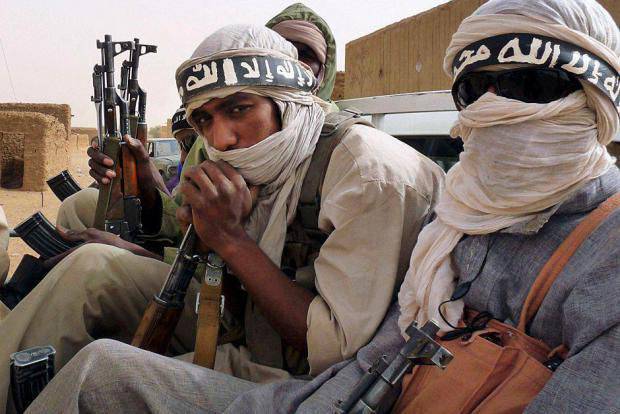
The backbone of the Islamist groups were Malian Arabs and the radicals from the Arab East who had entered the country. But there were many representatives of Tuareg youth in the ranks of religious-fundamentalist organizations, although in general Tuaregs are not very religious. The Ansar al-Din organization, the Defender of the Faith, created in the north of Mali under the leadership of Ayyad ag Gali, became the main Tuareg Islamist group. By the spring of 2012, the grouping consisted of 300 militants, but a small number did not prevent the unarista from winning a number of victories over the forces of the NLAA. Religious extremists literally followed on the heels of MNLA, displacing its militants from the cities liberated from the Malian troops. For example, 30 in March, 2012 of the Ansarists seized the city of Kidal, and 2 in April of 2012 pushed the formation of MNLA from Timbuktu. The leader of Ansar ad-Din, Omar Hamaha (1963-2014), stated that his organization was not in favor of building a Tuareg state, but in creating a Shariah state throughout Mali. Gradually, the religious radicals succeeded in squeezing MNLA seriously. 15 July 2012. Islamists were able to defeat the MNLA and capture the city of Gao, after which the creation of the Islamic state of Azawad was proclaimed, and Omar Khamakh took the post of “rais” - the ruler of the Shariah state. In the ancient cities of Gao and Timbuktu, the destruction of ancient shrines began - palaces and mosques that were not only revered by the local population, but also considered world cultural monuments (international tourism in Gao and Timbuktu, before the start of the civil war, gave the bulk of income to Northern Mali). Despite the fact that all these objects were created by Muslims, jihadists declared them an example of “architecture of idolatry”. Radicals wiped out the mausoleums of Sufi "saints" revered in Mali (Sufi tarikats are widespread in West Africa), which caused discontent of a significant part of the local population. After the seizure of Gao, the leaders of the Tuareg separatists from MNLA announced the end of the struggle for the independence of Azawad and agreed to remain a part of Mali as autonomy. For such a principled concession, the leaders of the Tuareg were forced by the victories of the jihadists and the actions of the latter to destroy the cultural values of Azawad, after which the NLADA concluded that it was necessary to form an alliance with all the armed forces fighting against the Islamists.
Operation Serval - France comes to the rescue
Meanwhile, in mid-September, the government of Mali appealed to 2012 in an appeal to the world community to send an international military contingent to Azawad. The Economic Community of West Africa (ECOWAS) has indicated its readiness to send troops from 3300 to Mali. In this case, the general leadership and training of the contingent assumed France. However, it soon became apparent that the forces of the Malian army and ECOWAS did not stop the radicals - the latter began to advance south, taking several settlements in the center of Mali. At the start of 2013, France was forced to launch a Serval military operation. 11 January 2013 The helicopters of the French army attacked a moving column of radicals in the region of Sevare. On January 14, MNLA leaders announced possible support for the actions of the French troops, but on condition that the Malian units were not entering Azawad territory. The entry of France into the war in Mali did not leave any chance for the jihadists - forces were too unequal. 15 January 2013 French and Malian troops moved out of Bamako, and already 16 January fought with the rebels in the area of the city of Diabali. 18-19 January Malian troops liberated Diabali and Cohn with the support of the French Air Force, 21 January liberated the city of Duenza, 27 January the French-Malian units entered the city of Timbuktu, 30 January was liberated from the jihadists the city of Kidal, and 8 February - Idehel. It is noteworthy that the Russian airline Volga-Dnepr and the 224-th flight squad participated in the organization of transportation of French military equipment and equipment by air. In addition, planes and helicopters from Belgium, Spain, Sweden, Germany, Denmark and a number of other countries were sent to the aid of France and the ECOWAS coalition. After driving out militants of the radical organization Ansar-ad-Din from the territory of the cities of Azawad, local power passed to representatives of the moderates of the National Movement for the Liberation of Azawad and the Islamic Movement of Azawad (the last group broke away from 24 in January 2013 of Ansar ad-Din. , speaking for the development of a dialogue with the international coalition and against "all forms of extremism"). President of Azawad Autonomy remained Bilal al-Asherif, who holds this position until the present.
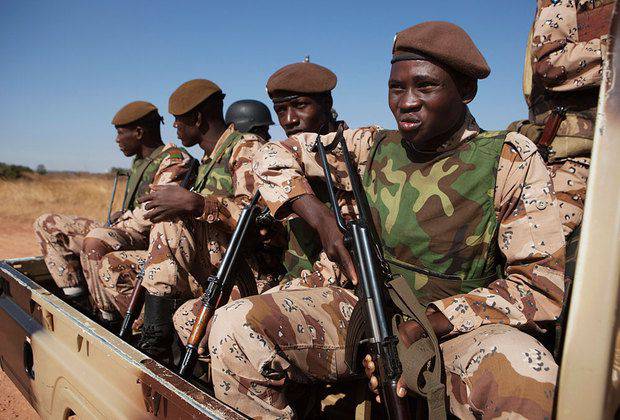
Having started the operation in Mali, France actively used anti-terrorist rhetoric, to which almost all countries of the world have resorted to in modern times. However, counter-terrorism considerations, of course, were subordinated to the more specific economic and political interests of France in the Sahara-Sahel zone. Recall that Mali is a former French colony, and Paris very carefully monitors the political situation in its former colonies, periodically intervening to overthrow disagreeable or bring to power allied regimes. Mali is no exception. Moreover, one of the poorest countries in the world and Africa, Mali has enormous economic potential. The state ranks third in Africa in terms of gold production, and also has promising uranium and hydrocarbon reserves. Naturally, France could not let go of the political situation in an economically interesting former colony that was so economically interesting “to chance.” Gold mining and export accounts for 75% Mali's foreign exchange earnings and 20% of the country's GDP. Western companies are engaged in the mining of precious metals, mainly Australian and Canadian. The actions of extremists could paralyze the mining of gold in the Malian deposits and, thus, violate the economic interests of a number of countries. We should not forget that the development of uranium deposits is quite promising in Mali. Currently, the center of uranium mining in West and Central Africa is Niger. The French state-owned corporation Areva, which supplies 3 thousand from Niger to France every year, operates here. tons of uranium. By the way, this is a third of the annual uranium demand of French nuclear power plants. The intensification of Islamic radicals in Mali poses a direct threat to French uranium mining enterprises in Niger, since the Malian-Nigerian border is poorly guarded, and the political situation in Niger is close to Malian — there is also an impressive Tuareg minority who have difficult relations with the negroid peoples of the south, who dominate the postcolonial political and military elite of Niger. Niger, like Mali, is one of the poorest countries in the world and Africa, with the same social, economic and ethnopolitical problems. Therefore, the invasion of France in Mali is easily explained by the political and economic interests of the French state in Africa. Moreover, the French armed forces possessed for this the necessary potential - the military bases of France are located throughout the African continent. The French units of the Foreign Legion, Army, Air Force and Navy are stationed in Djibouti, Burkina Faso, Chad, Gabon, Cote d'Ivoire, Senegal. It should not be forgotten that much of the ECOWAS countries are French satellites and are ready to send their armed forces to the defense of French interests by the first hint from Paris.
The war is not fully completed
At the same time, many experts believe that France was able to defeat the main forces of the Islamists, oust them from large cities, but not completely eliminate the terrorist organizations of Mali. Given the length of the vast Sahara expanses, the transparency of the state borders of Mali, Niger, Libya, Algeria, almost uncontrolled flows of weapons from Libya, the terrorists were able to calmly disperse, avoiding direct clashes with French and Malian troops. Despite the fact that the French troops managed to defeat the Islamic groups, the latter turned into decentralized communities, which are even more difficult to fight because of their “dispersal” and amorphous internal structure. In June 2015, it became known about the death of the Algerian militant Mokhtar Belmokhtar, who commanded the Saharan jihadists and lost his eye during the civil war in Algeria. Belmohtar stood by the organization of the famous terrorist attack in January 2013, when militants took 800 people hostage and killed 40 people at a gas field in Algeria. By the way, France still holds 3000 troops in Mali, but, as we see, this measure does not contribute to the prevention of major terrorist attacks. Back in March 2014, information appeared that jihadists were gradually penetrating North Mali and preparing to take revenge after the French contingent left the country. There are very big doubts that the Malian army will be able to resist them. First, the armed forces of Mali are relatively small. The country simply does not have the means to maintain a large army. At present, the armed forces of Mali include the army itself, the air force, the gendarmerie, the republican guard, the national guard and the national police. The number of armed forces - 7 military personnel in the army, 350 - in the air force, 400 - in the river navy, 1800 - in the gendarmerie, 2000 - in the republican guard and 1000 - in the national police. However, it should be noted that these figures exist rather "on paper". In fact, only about 5 thousand Malian troops can be involved in a real military conflict. And only 2 thousand soldiers and officers, according to experts, will be ideologically motivated.
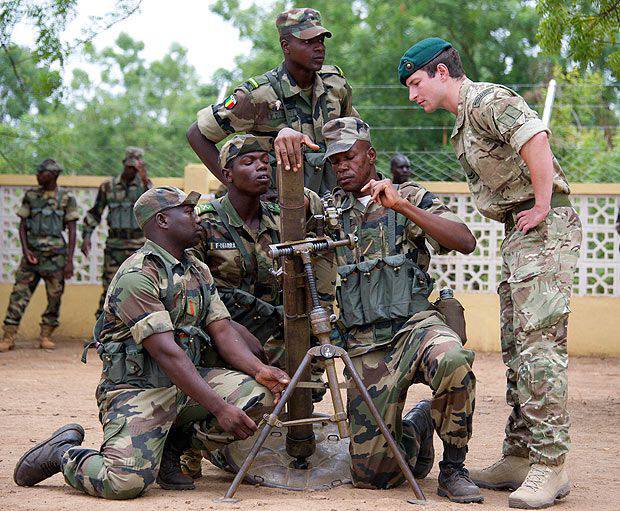
Secondly, as in many other African countries, in Mali, internal ethnic and tribal tensions are strong, which inevitably affect the controllability of the armed forces. In particular, the command practically can not count on the loyalty of the soldiers recruited from the Tuareg and the Arabs. That is, more or less reliable are only people from Southern Mali. In addition, in the army itself, including its officer corps, the tacit competition of two clans - the "green berets" (motorized infantry units) and the "red berets" (parachute units) continues. Thirdly, the Malian armed forces are devoid of the ideological motivation that jihadists have. Modern Mali has virtually no ideology, fundamental goals and objectives of state development. This is a common problem of African countries that benefits the United States and the countries of the European Union. Yesterday's colonies have not gained a clear meaning of their existence, which means they do not strive for real modernization and continue to exist in the orbit of the influence of their former metropolitan areas. On the other hand, there are militant paramilitar formations “Children of the Nation” (“Ganda Izo”) and “Death is better than disgrace” (“The Bund Ba Xavi”). They bring together representatives of the Negroid peoples of Southern Mali and are recruited mainly from representatives of the lower classes. These “militias” are ready for confrontation with the Arab-Tuareg Islamists in words, but in reality, given the almost complete lack of training and weapons in the form of guns and clubs, they are unlikely to be a serious counterbalance to jihadists armed with modern weapons transferred from Libya. But the growing discontent with the activation of the Islamic radicals in the north of the country entails ethnic conflicts in southern Mali. Here, all fair-skinned people begin to personify with terrorists, as a result of which attacks on Tuareg, Arabs, and Fulbe, residing in South-Malian cities, occur.
International human rights organizations have reported numerous incidents of ethnic attacks in southern Mali. The mutual dislike of the peoples of North and South Mali is historically conditioned. It is known that the Tuareg and the Arabs of the north for centuries attacked the sedentary Negro population in order to plunder villages and seize people for sale into slavery. Historical insults are still alive. Therefore, war crimes occur as northerners against southerners, and vice versa. When Malian government troops liberated a number of cities in the north from the radicals, they began massacre of the local population, which officers and soldiers of the Mali army recruited in the south of the country were suspected of sympathizing with fundamentalists and separatists.
In 2015, a new organization, Al-Murabitun, became active in Mali, which took responsibility for the shooting at the Radisson Blue Hotel. Al-Murabitun emerged from the merger of the Unity Movement and Jihad in West Africa with a radical group that broke away from Al-Qaida. In August, 2015, Al-Murabitun militants attacked a hotel in the city of Sevara in the center of Mali. Armed militants took hostages, 13 people died, including five United Nations personnel and four members of the Malian army. In Bamako, Al-Murabitun organized the shooting of bar visitors for expats. By the way, back in May, 2015, Al-Murabitun, announced its accession to the Islamic State terrorist organization banned in the Russian Federation. It turns out that the terrorist attacks in Mali also have an “IS trail”, although up to the present, the IS actually didn’t function on the territory of West Africa (both Al-Murabitun and Nigerian Boko Haram are more allies of the IS than its sub-units) .
Taking hostages at a hotel in Bamako is a serious challenge to the authorities of Mali and the entire world community. But this crime should be perceived not only as a demonstration of strength and independence from world public opinion on the part of radical organizations. The very possibility of holding such actions testifies to the weakness of the Malian government and the incompleteness of the fight against radical terrorist organizations operating in the territory of the state. It is likely that in the near future Mali will overwhelm a new round of armed confrontation, in which, one way or another, not only Malian armed forces, but also France and ECOWAS countries will be forced to take part.
- P P 'SЊSЏ RџRѕR "RѕRЅSЃRєRёR№
- planetolog.ru, http://iv-g.livejournal.com/1107331.html,http://novayagazeta-ug.ru/, aljazeera.com, Joe Penney / Reuters, http://www.thesun.co. uk /
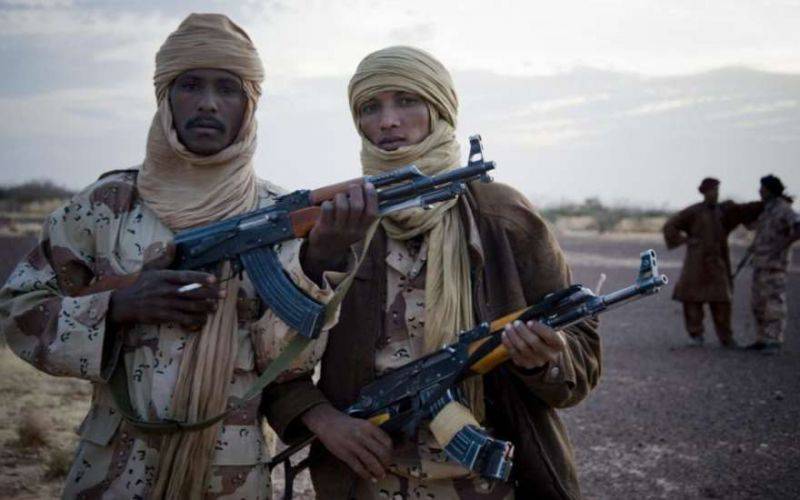
Information